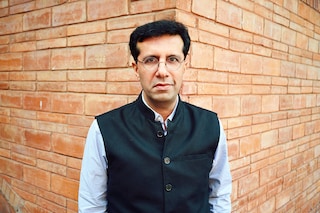How Ashish Dhawan gave up his high-flying investing career to solve India's educ...
The co-founder of Ashoka University talks about setting up an interdisciplinary education institution, and how it is different from running a business


It is not very often that we come across an entrepreneur and investment manager of a multi-billion-dollar fund who, in his early forties, gave up a successful career to jump into philanthropy fulltime. This is the story of Ashish Dhawan, co-founder of one of India’s leading private equity firms, Chrys Capital, founder and chairman of Central Square Foundation, founder and CEO of The Convergence Foundation, and co-founder of Ashoka University.
Dhawan is on a mission to fast-track India’s growth by reimagining its education sector. In 2010, he co-founded Ashoka University and brought on board 170 philanthropists to share his vision of a world-class interdisciplinary higher education institute in India. He also set up The Central Square Foundation in 2012 to ensure India’s 250 million children have access to equal opportunities irrespective of their financial backgrounds.
“I didn’t want to just cut cheques. My life’s work is about building institutions," says Dhawan, now in his early fifties, in an exclusive interview on Forbes India Pathbreakers.
This also meant forming a shared governance model for transparency. “It’s not going to work if there is one family that is going to dominate. We have a collective philanthropy model and there is a shared governance model with the academics. So that is very different from the corporate world, where it is much more hierarchical, where it is much more about the board and the CEO and that single structure. There are many more structures in a university."
However, building and working with a foundation or non-profit like Central Square Foundation, which works in school education, was a different experience. “I had to learn a number of new things. How do you work with the government? The government spends Rs 7 lakh crore on education it is the main actor. If you don’t work with the government, then you can’t have large-scale impact, and whatever you do is not sustainable. Two, there is a lot of learning about what actually works in education. It’s very complex. It’s not easy to change the classroom transaction and what suits the Indian context. Just copy-paste from Finland to India is not going to work. And so, it took a lot of humility. People in the non-profit world are motivated very differently from people in the corporate world. You have to learn to respect them, to work with them, to partner with them. So, those are all new skill sets that I had to develop over time. And I enjoyed it because part of my heart was already there."
The founding team initially started with an off-campus programme called the Young India Fellowship on a rented site. "It was a non-degree programme, like our pilot. We did that well. Then we started with the undergraduate programme, with only humanities and social sciences we didn’t start all the disciplines. And then slowly we grew and expanded into the sciences and computer science. We’re truly an interdisciplinary university. I think people often say ‘Liberal Arts’ where they think we’re only teaching humanities and social sciences. But what they don’t realise is over the last eight to 10 years, we have covered almost all disciplines, about 20."
“What we have consciously left out are professional degrees—engineering, medicine, and law—because there are a number of institutions in India that focus on those. We said, what’s missing is this interdisciplinary university that focuses on humanities, social science, fundamental sciences, and computational data science. And that’s what Ashoka now is. It’s a place of excellence in research and teaching. So, in 10 years, I think we have come a long way. But it will take us another 10 to 15 years to build real excellence in the sciences and in research. We have a small PhD programme, and plan to build a top-notch one. So, it’s a lot of ground to cover in the coming years."
First Published: Jun 13, 2023, 11:35
Subscribe Now